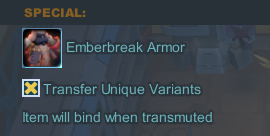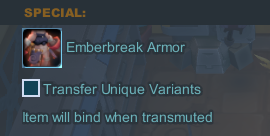Difference between revisions of "Crafting"
From SpiralKnights
m (→Economics: adjust wording) |
(→Economics: shorter; trying to avoid belaboring the point) |
||
| Line 31: | Line 31: | ||
A 5-star recipe costs more than its 2-, 3-, and 4-star versions combined. The overall cost of a completed 5-star item dwarfs the entire cost of making a 4-star item from scratch and heating it. In other words, as far as cost is concerned, a typical 4-star item is far less than halfway finished on its way to being a fully heated 5-star form. | A 5-star recipe costs more than its 2-, 3-, and 4-star versions combined. The overall cost of a completed 5-star item dwarfs the entire cost of making a 4-star item from scratch and heating it. In other words, as far as cost is concerned, a typical 4-star item is far less than halfway finished on its way to being a fully heated 5-star form. | ||
| − | The following table summarizes the standard crafting costs of most items. | + | The following table summarizes the standard crafting costs of ''most'' items. Items crafted at special alchemy machines often have no recipe cost. Also, a few exceptions, such as [[Swiftstrike Buckler]], have unusual material costs. |
{{CraftingEconomics/Start}} | {{CraftingEconomics/Start}} | ||
Revision as of 15:41, 29 October 2015
Crafting is the process by which new equipment is made.
Contents
Basics
Crafting, a.k.a "transmuting" an item requires the materials listed in its recipe, three orbs of alchemy (with the exception of furniture), a number of crowns, and usage of the correct alchemy station.
If the item is crafted at the regular Alchemy Machine, the player must obtain and learn the recipe as well as collect the components of the desired item. Items made at the regular Alchemy Machine can be made anywhere in Haven by opening the recipe tab, which is keybound to F5 by default.
Once the player has collected the required components, the desired item can be transmuted. Certain items must be crafted via specific stations, and in the case of furniture, components must be collected in the treasury of the player's guild instead of the arsenal.
Crafting is not tied to any skill and always succeeds.
Upgrading
When upgrading an item from one star level to the next, crafting also requires a precursor item. Items related to each other in this way are in the same alchemy path. The precursor item must be unequipped in order to be used in a craft. The upgraded item replaces the precursor item in the player's arsenal.
To upgrade a 3-star item to 4 stars, the 3-star item must be heated to level 5 or higher. To upgrade a 4-star item to 5 stars, the 4-star item must have heat level 10. Beyond these minimum requirements, the heat level of the precursor item has no effect on the quality of the upgrade. The upgraded item always begins at heat level 1.
If the precursor item is bound, then the newly upgraded item will also be bound. Because an item must be equipped to be heated, and equipping an item binds it, this means that any newly made 4- and 5-star item is bound. The item cannot be traded to another player, unless an unbinding fee is paid at Vise.
When upgrading an item with one or more unique variants, the player can choose whether to "Transfer Unique Variants" under the "special" section of the crafting interface. If the UVs are kept, then the upgraded item will have those UVs, with no chance of more or better UVs. If the UVs are discarded, then the upgraded item has the same chance of acquiring up to three UVs. This chance is the same chance as an item made from scratch.
Upgrading preserves accessories, as long as the upgraded version has the accessory slot. If the item does not have a slot for the accessory, then the accessory is destroyed. For example, if an Ash Tail Coat with an aura attached is upgraded to a Skolver Coat then the aura will be destroyed.
Economics
Acquiring an item via crafting is almost always significantly less expensive than buying the item from a vendor or the Supply Depot. Crafting also offers a chance of acquiring up to three unique variants, which does not occur when the item is purchased from a vendor or the depot.
A 5-star recipe costs more than its 2-, 3-, and 4-star versions combined. The overall cost of a completed 5-star item dwarfs the entire cost of making a 4-star item from scratch and heating it. In other words, as far as cost is concerned, a typical 4-star item is far less than halfway finished on its way to being a fully heated 5-star form.
The following table summarizes the standard crafting costs of most items. Items crafted at special alchemy machines often have no recipe cost. Also, a few exceptions, such as Swiftstrike Buckler, have unusual material costs.
| Star Level | |
|
Prerequisite Heat | Orb of Alchemy x3 | 0* |
1* |
2* |
3* |
4* |
5* |
| ★☆☆☆☆ | 250 | 200 | - | |
3 | 2 | - | - | - | - |
| ★★☆☆☆ | 1,000 | 400 | - | |
5 | 2 | 2 | - | - | - |
| ★★★☆☆ | 4,000 | 1,000 | - | |
10 | 3 | 2 | 1 | - | - |
| ★★★★☆ | 10,000 | 2,500 | 5 | |
15 | 4 | 3 | 2 | 1 | - |
| ★★★★★ | 25,000 | 5,000 | 10 | |
20 | 5 | 4 | 3 | 2 | 1 |
History
- release 2011-05-17: Changes to crafting economics
- release 2011-07-20: Changes to alchemy regarding UVs
- release 2012-10-17: Improved crafting interface
- release 2013-07-30: Crafting no longer requires a payment in energy. The cost was shifted to orbs of alchemy.
- release 2013-10-16: Material Finder added to interface


